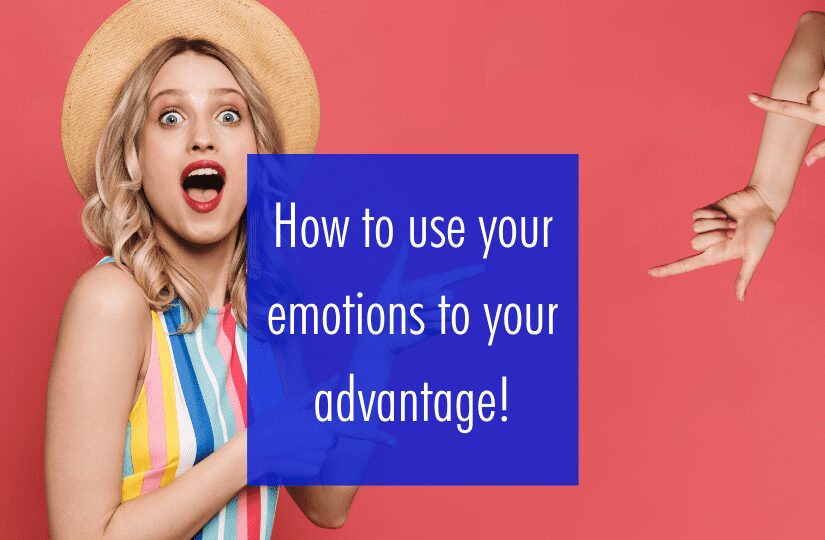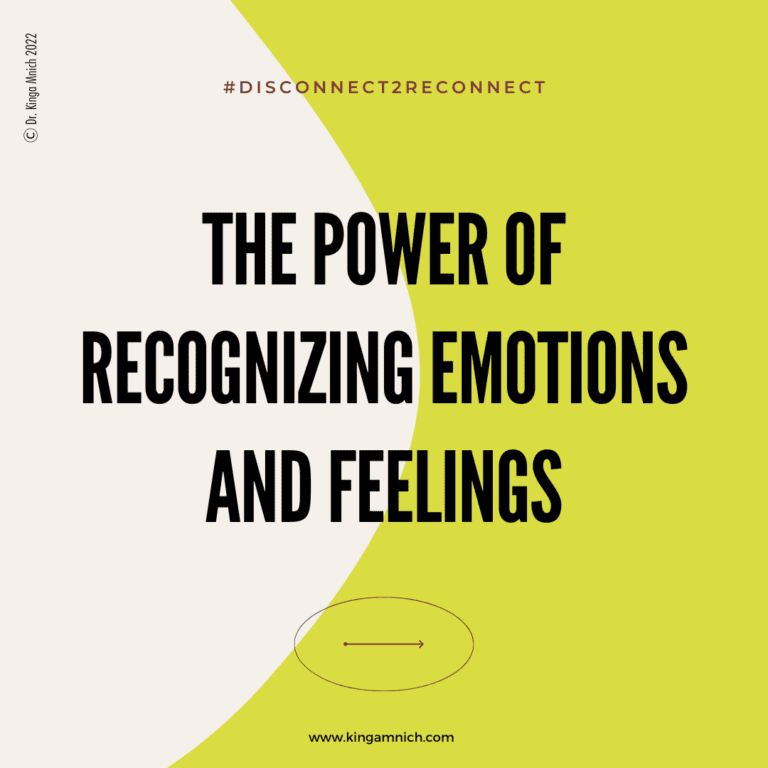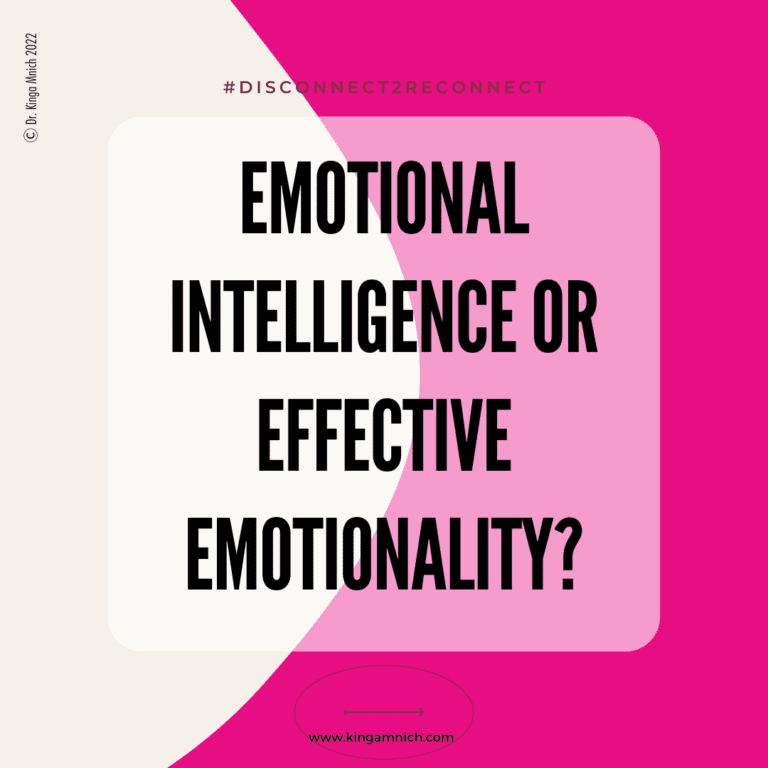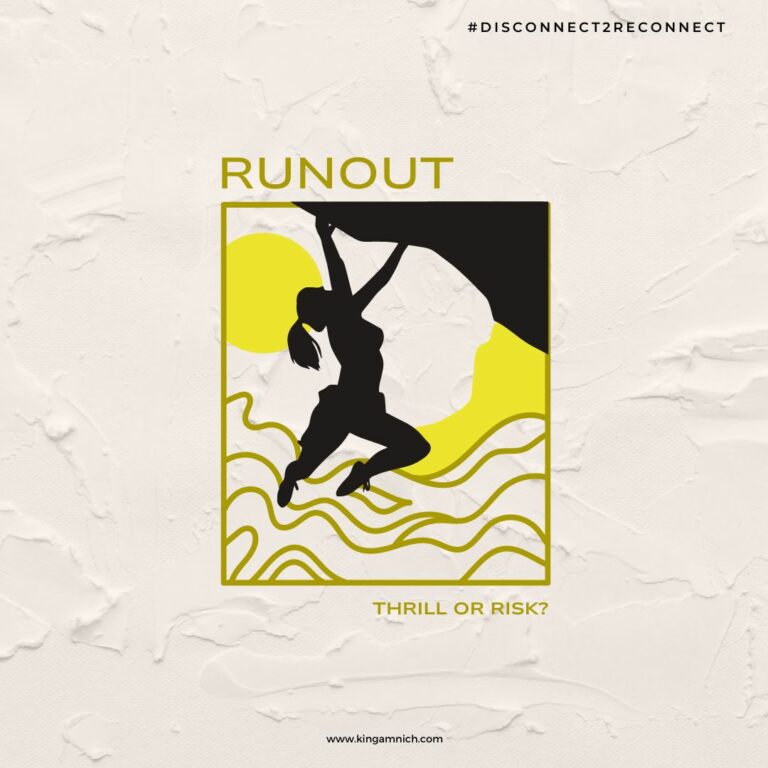The complexity of emotions has not just led to many misleading conceptions in research. It has also given emotions a lousy reputation. But the more we learn about them, the more we understand that emotions are your superpower and can be used to your advantage.
A well-developed emotional intelligence, not emotional sensitivity, but a reflected understanding of the complexity of emotions, differentiates between high-achievers and people trying to make it but cannot create the necessary change.
Why is that?
Did you know that effective change happens only in accordance with positive emotions? This is because our brain develops and grows new neural pathways through positive experiences and thoughts. Let me rephrase that: negative emotions and experiences hinder the development of new neural pathways. Therefore, they hinder us from learning, being creative, and finding solutions for new problems.
That doesn’t mean that you need to ensure that you are living a happy life. On the contrary, the full spectrum of emotions is necessary to understand how the other side of the coin looks. You can know what true joy is without understanding sadness or even lose.
Therefore, it is essential to experience anger, fear, and even jealousy in order to reflect on your emotional understanding.
How emotional culture impacts emotions.
Most likely, you have come across the common conception that nordic European countries are stoic, Latin countries are highly emotional, Americans are often perceived as fake, and eastern European countries are highly negative. As much as some of these are exaggerated, culture goes beyond traditions, values, and norms. It modulates how we understand and express emotions. It tells us how we should feel in specific situations and which emotions we need to express. Therefore you and I will most likely have a different understanding of emotions. We might even express emotions in another way.
Just to give you an example: I remember celebrating one of my birthdays in Florida with my exchange-host family. They were very excited to have me there, made a special cake, and had a wonderful birthday gift. After opening the gift, they wanted to know if I liked it, and in my very German way, I responded, yes, it is good. Now for many Americans, that means that I didn’t like it too much since I didn’t express in full excitement how amazing the gift was. I wasn’t just modulating and holding my emotions back. I never learned the culturally appropriate expression on showing in an American context that I liked the gift.
The difference between emotionally intelligent and emotionally sensitive.
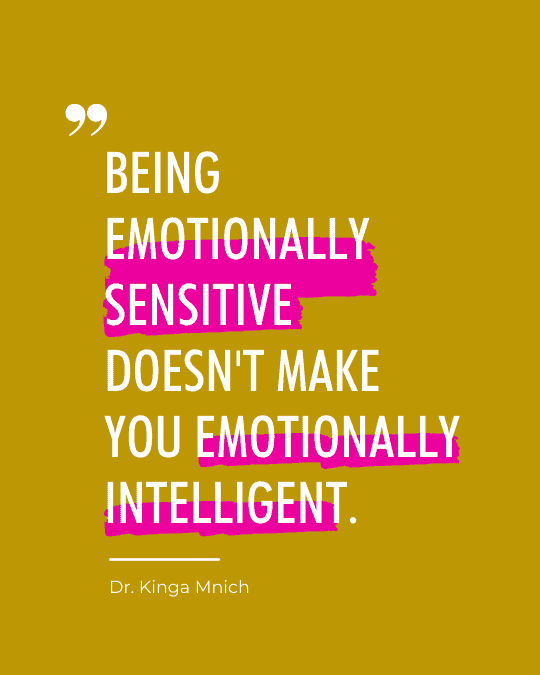
In recent years the conversation on how to be emotionally sensitive has influenced various psychological and social discussions. Including the topics of being an empath and having a higher emotional understanding. A terrain that is very difficult to navigate through, especially when many people think it is more important to listen to your own emotions and give yourself space to feel everything you are feeling.
Firstly, just because someone allows herself to feel everything doesn’t mean they have high social-emotional intelligence. It is one thing to feel what you are feeling and another to place it into a context and understand how your emotions affect others. Secondly, your understanding of specific emotions can differ. Meaning, emotions can easily be misinterpreted. I regularly see this when women express their excitement about a project, and men misinterpret it as too emotional.
Emotional sensitivity vs. intelligence
Rather than developing emotional sensitivity, it is necessary to develop emotional intelligence that allows a full-spectrum reflection on emotions. That means that it is not essential to decoding right away what others are feeling. Instead, it is consequential to give space for review because emotions are a complex social construct beyond the physical experience of feeling.
The three sides to emotions.
As previously written and shown in my research on “masculinity and emotions in high-security prison facilities,” emotions have three components: Experiencing, evaluating, and expressing – the 3 E’s. Emotions are, therefore, another dynamic social process, and they are always moving. They are not static cultural constructs and are not embedded in set rules. Each of us has an individual imprint of how to understand our emotions. Upbringing, culture, family structure, gender, and social environment are just a few factors influencing our emotional world.
The one common factor that we as human beings around the world share, is that we are emotional beings and not rational. So our rationale is influenced by our emotions. And without a trained reflective process, we can’t be anything else than subjective in our interactions and decisions. And, of course, pure objectivity is, in my opinion, something that is impossible to reach. But, still, through an appropriate reflective process, we understand how we are influencing our decision-making process.
Why do we need to let go of the belief that rationale is the only way to make decisions!
On the risk of sounding too holistic, life is a full-body experience. We need all of our senses to be able to create full memories. We smell, feel, see, hear and touch our environment. Nevertheless, many believe that decisions should be solemnly made through rational thinking—meaning taking facts, statistics, and past experiences into account while forecasting the future. A successful decision is a decision that results in precalculated results. But life is constantly changing. Everything around us is in constant change, and if you are acting outside physical laws, you might quickly run into issues with your forecast.
Instead of relying on the path of making decisions, consider making your decisions based on an all integrating approach.
Holistic decision-making.
Please bear with me for a moment, even if you have an adverse reaction to the word holistic. These six pillars help you make decisions: rationale/logic, motivation/desire, intuition, creativity, physicality/bodily, and emotions.
Many prefer making decisions and rely on one or few pillars instead of integrating every aspect of our human experience. Especially the emotional part is being left unattended or suppressed, which doesn’t mean that you can turn off your emotions. Instead, you are not reflecting on how your feelings are impacting your decision-making process.
The best example of this was the economic crisis in 2008 when fear was one of the guiding emotions to many financial investors (read more here). The gravity of the situation could have been prevented through emotional regulation and understanding of the individual and collective emotions, especially because emotions are contagious. Suppressing emotions doesn’t mean that you become more logical. On the contrary, you are afraid of actually facing a whole experience and therefore prohibiting a well-reflected decision. Allowing yourself to step into your decision superpower means allowing yourself to step into your emotions.
This is why emotional intelligence is a superpower.
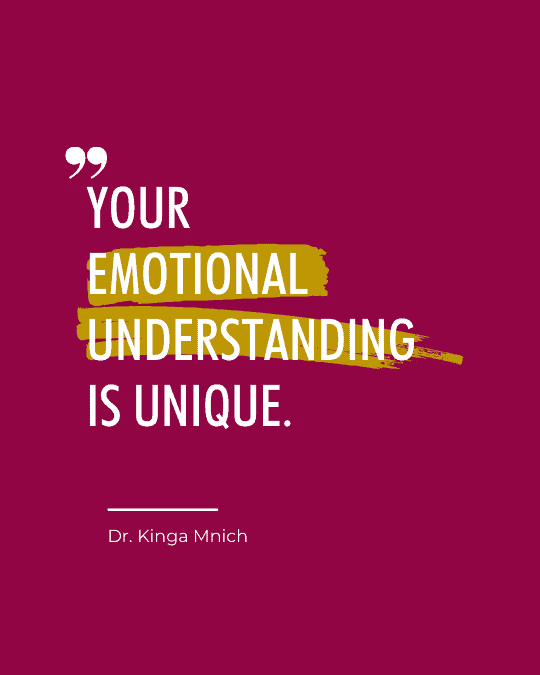
Being emotionally intelligent is the other kind of intelligence. It involves understanding how others feel and how we feel. With this in mind, it allows us to interact positively with one another. In particular, it will enable us to understand that the other person is doing the best they can. It also allows us to:
- build healthy relationships
- Fuels relationships with trust and positivity
- It will enable you to express yourself better
- Be more successful
- And allows you to express your emotions in a sensitive and nurturing way
- Prevents conflict
But there is much more to it. Positive emotions are responsible for evolution and progress (read more here & Robert Wright demonstrates the effect of positive emotions and experiences on how we have evolved as humankind in his book Nonzero).
Why taking a step back and breath can help you to better understand your emotions.
Being able to take a step back from your emotions and observe them rather than react to them immediately is a skill that helps you be more successful in life. Choosing which emotions you respond to is a significant milestone in deciding where you guide your attention to and how you navigate through difficult circumstances. It allows you to mitigate the impact of stress on your body and brain. Developing a mindset that helps you reach your goals and experience success.
Focusing on positive emotions and creating more positive experiences in your life builds resilience (emotional resources needed for coping). Positive emotions broaden our awareness and therefore allow us to see more solutions to problems. In addition, the latest brain research shows compelling evidence that positive emotions increase our creativity and prevent degenerative diseases such as Alzheimer’s, Parkinson’s, and early-onset dementia.
Further, studies show that people do their best when they have at least three times as many positive emotions as negative emotions because they feel better (read more in The Happiness Advantage by Shawn Achor).
How can we cultivate positive emotions as the path forward?
One of the questions that many of my clients ask me is: how can I overwrite or change my negative emotions? And how can I create more positive emotions even when I am feeling down?
Let’s start with the second one. One of the general issues is with our own cultures, especially in individualistic cultures, there is a tendency to focus on the negative comments around you. Of course, this is partially based on the negativity bias, but culture plays a significant role in how we experience our surroundings.
The second dilemma that many of us have is that we are in constant competition, which means that we are in a constant state of comparison. This alone makes us feel inadequate and makes us question our own identity.
The third difficulty that we are facing is that we base our identity on how we feel. One of the reasons for that is the individualization of emotions. Meaning we assume that every emotion that we are feeling is our personal emotion. This is when the ability to step aside and observe your emotions from the sideline becomes a tremendous change maker.
Not every emotions that you are feeling started within you.
As a reminder, emotions are socially and culturally constructed. They are made to keep us in check. However, especially emotions such as shame and power leave long-lasting negative marks on our individual development. They are designed to make you feel inadequate. Of course, they are necessary tools for normal social behavior but often leave a negative imprint that can easily cause depression and anxiety. More so, they prevent you from becoming the best version of yourself.
Cultivating positive emotions is a necessary step towards balancing out the negativity bias and degrading social effects. And this is how you can do it.
Tools to cultivate positive emotions:
- Focus on others and how they positively impact you. Specifically, give sincere thanks to others. Research has shown that one of the most effective tools to get your mind away from negativity and negative emotions is to focus on others and how others are bringing joy into your life.
- Celebrate your strengths. Acknowledging your strengths and what you are good at is important to understand that you do have the power to change and overcome difficult situations.
- Keep a gratitude journal with you. For example, try to write down every evening the good things that happened throughout the day and read through the journal when you feel down. Explicitly try to focus on the positive emotions that you have experienced in these situations. It might help to describe how it made you feel when something went well. And recall these emotions. Shifting your focus allows you to change your perspective.
- Speak to someone that has a different perspective on the situation. Yes, sometimes we want sympathy and someone to listen to your rant. I am a firm believer that letting frustration out can be one of the methods to get you back up. It’s like detoxing your brain from negative thoughts. But if this process takes longer than a few hours, you might need help to move you out of negativity and into the state of flexibility (set vs. flexible mindset). Make sure that you have a list of people that can show you a different perspective and be open with your request.
- Reflecting on your behavior. Find an opposite argument to every point you are making. The world is round, and our emotional experiences are a dynamic process in itself. Remember, without experiencing negative emotions. You wouldn’t have the ability to experience positive ones. The contrast is what is needed. So when you are stuck in negativity, try to contrast your thoughts and emotions.
- Find the positive in an adverse event from your past. And reflect on events that had a more significant long-term effect on your life.
- Create time to stay connected with people you care about in your life and invest quality time into these relationships.
- Offer sincere compliments. This allows you to focus on others but also build meaningful connections. And remember, emotions are contagious. So if you make someone else feel you, you will also feel good.
Other activities that help cultivate positive emotions include practicing mindfulness and finding the silver lining in difficult situations. Reading funny and entertaining books and watching funny light comedy can also increase oxytocin and dopamine. Thus, two hormones play a significant role in how we feel.
Another trick to start changing how you think and feel is observing other people and how they deal with difficult situations. You can also reflect on the following questions in your journal:
- What can you learn from people who stayed optimistic in life even though they experienced significant loss?
- Have you or someone you know experienced growth as a result of distress?
Learn from other cultures.
One of my favorite and most effective ways to prevent and dissolve depression and a negative life experience is traveling. And by travel, I don’t mean going on an all-inclusive vacation and never leaving the hotel or boat (At times, however, even this can be very effective. Especially if you are close to a burnout). What I am referring to is to travel to countries with different cultures. One of my favorite places is Mozambique or South Africa. In these scenarios, it is not about focusing on what you have, and these people don’t have, but seeing how magnificent their attitude towards life is even though they don’t have everything we have.
And don’t get me wrong, many developing countries need support and more access to resources such as education, technology, and health care. But many of us have forgotten the simplicity of life and the ability to be in the present moment.
How to be in the present moment?
Yes, you are being reminded of being in the present moment constantly. And yes, many articles, podcasts, Clubhouse rooms, and various other resources preach mindfulness and meditation. Nevertheless, this is one of the most challenging things. Traveling and seeing other cultures living on a day-to-day basis allows you to take in and experience again what it means to be in the moment.
And being in the moment is one of the most effective ways of being able to experience positive emotions. Notably, creating these memories is what will allow you to build resilience.
BTW traveling is one of my favorite ways of practicing mindfulness.
Are you looking for support in learning to create more positive emotions in your life or want to be a more authentic leader? Feel free to reach out to me, and let’s see how we can work together.
Additional articles:
Five Ways To Better Understand Your Emotions.
Want your employees to trust you show your trust them.
How fear impacts decision-making.
Financial Crisis Illustrates Influence of Emotions, Behavior on Markets.
The psychology of financial decision making and economic crises
Shame- and guilt-proneness: relationships with anxiety disorder symptoms in a clinical sample

